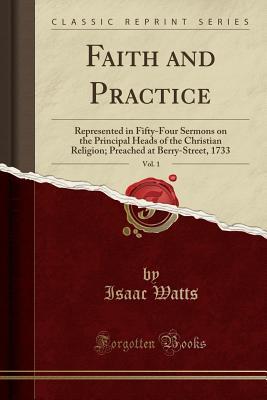- Bible
- Read the Bible
- Bible Versions
- Verse of the Day
- Reading Plans
- Verses by Topic
- Books of the Bible
- Bible Images
- Study
- Commentaries
- Concordances
- Dictionaries
- Encyclopedias
- Sermons
- Bible Atlas & Maps
- BP Wiki
- Devotionals
- Today's Devotionals
- Light of the World
- All Devotionals
- Inspirational Quotes
- More
- Picture Quotes
- Videos
- Inspirational
- Bible Study
- What The Bible Says
- Bible Q&As
- Daily Bread
- Bible by Genre
- Bible Stories
- Random Bible Verse
- Community
- Store
Excerpt from Faith and Practice, Vol. 1: Represented in Fifty-Four Sermons on the Principal Heads of the Christian Religion; Preached at Berry-Street, 1733
For this purpofe, at the Requeft of that worthy Gentleman to whom thefe Volumes are inferibed, we drew up the molt neceltary and important Articles of the Chrifiian Religion into fo many diftinet Heads, and form'd a Sermon Upon each of them, that by reading one in aweekfthey might be finifh'd in a bout a Year'stime, and that whole Fa milies might receive fome brief Inflruc 'tion in all the molt necefi'ary parts of Faith and Practice, in order to their e verlafting Welfare.viii The P R E fta C E.
About the Publisher
Forgotten Books publishes hundreds of thousands of rare and classic books. Find more at www.forgottenbooks.comwww.forgottenbooks.com
This book is a reproduction of an important historical work. Forgotten Books uses state-of-the-art technology to digitally reconstruct the work, preserving the original format whilst repairing imperfections present in the aged copy. In rare cases, an imperfection in the original, such as a blemish or missing page, may be replicated in our edition. We do, however, repair the vast majority of imperfections successfully; any imperfections that remain are intentionally left to preserve the state of such historical works.
For this purpofe, at the Requeft of that worthy Gentleman to whom thefe Volumes are inferibed, we drew up the molt neceltary and important Articles of the Chrifiian Religion into fo many diftinet Heads, and form'd a Sermon Upon each of them, that by reading one in aweekfthey might be finifh'd in a bout a Year'stime, and that whole Fa milies might receive fome brief Inflruc 'tion in all the molt necefi'ary parts of Faith and Practice, in order to their e verlafting Welfare.viii The P R E fta C E.
About the Publisher
Forgotten Books publishes hundreds of thousands of rare and classic books. Find more at www.forgottenbooks.comwww.forgottenbooks.com
This book is a reproduction of an important historical work. Forgotten Books uses state-of-the-art technology to digitally reconstruct the work, preserving the original format whilst repairing imperfections present in the aged copy. In rare cases, an imperfection in the original, such as a blemish or missing page, may be replicated in our edition. We do, however, repair the vast majority of imperfections successfully; any imperfections that remain are intentionally left to preserve the state of such historical works.
BUY NOW
Paperback, 566 pages
Published April 28th 2018 by Forgotten Books (first published September 27th 2015)
© 2025 Bibleportal.com All rights reserved.

Isaac Watts is recognised as the "Father of English Hymnody", as he was the first prolific and popular English hymnwriter, credited with some 750 hymns. Many of his hymns remain in active use today and have been translated into many languages.
His education led him to the pastorate of a large Independent Chapel in London, and he also found himself in the position of helping trainee preachers, despite poor health. Taking work as a private tutor, he lived with the non-conformist Hartopp family at Fleetwood House, Abney Park in Stoke Newington, and later in the household of Sir Thomas Abney and Lady Mary Abney at Theobalds, Cheshunt, in Hertfordshire, and at their second residence, Abney House, Stoke Newington.
Though a non-conformist, Sir Thomas practised occasional conformity to the Church of England as necessitated by his being Lord Mayor of London 1700-01. Likewise, Isaac Watts held religious opinions that were more non-denominational or ecumenical than was at that time common for a non-conformist, having a greater interest in promoting education and scholarship, than preaching for any particular ministry.
... Show more